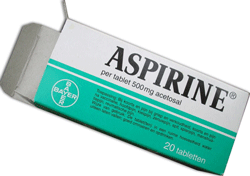81 mg dose Aspirin prevents Myocardial Infarction
 Aspirin, probably the most popular drug in the world is used successfully in treating and preventing Heart Attack. This happens because it breaks up the platelets in the blood that tend to clump and coagulate in clots. That can block blood vessels and lead to chest pain or Heart Attack.
Aspirin, probably the most popular drug in the world is used successfully in treating and preventing Heart Attack. This happens because it breaks up the platelets in the blood that tend to clump and coagulate in clots. That can block blood vessels and lead to chest pain or Heart Attack.
Recent studies shoe that it is no difference between an 81 milligrams dose and 325 milligrams dose of Aspirin - it produces the same effects, but it is safer. Instead these recommendations, some doctors continue to prescribe the 325 milligrams dose which is twice the amount patient really need. Usual this dose is prescribed when the first signs of Heart Attack appears.
On the other hand, Aspirin treatment is two-edged sword - it also increases the chances of serious bleeding and hemorrhages. So, the Heart Attack prevention with Aspirin should be done with correct and optimal doses, for to avoid adverse reactions.
Aspirin is a cheap drug, compared to other newer medications like the cholesterol-lowing statins or blood-pressure reducing ACE-inhibitors, very expensive, Aspirin seems to be the right choice in Heart Attack prevention.
The researchers at Duke University Medical Center say that one in 111 people who took low-dose Aspirin (81 milligrams) suffered significant bleedings, so Aspirin should be prescribed with caution even in low, 81 milligrams, doses.
Same researchers (Dr. Duke Berger and co.) revealed some illustrative statistics:
- those who took Aspirin daily had a 25% reduction in the risk of a stroke
- 26% risk reduction of developing a second Heart Attack
- 13% lower risk of death
- Overall, patients who took Aspirin were 21% les likely to encounter potentially fatal cardiovascular events than those who didn't take it
YOU MAY BE INTERESTED:
Aspirin, Antiplatelets and Thrombolytics in Heart Attack treatment
You might be interested in:
- Blood clots -- who is at risk and how to prevent them
- Death can be predicted by heart rate in patients with stable heart disease
- Heart attack controlled by Fish Oil and Vitamin E
- The benefits of walk and running in heart attack prevention
-
New articles
- Blood clots -- who is at risk and how to prevent them
- Smoking -- a habit which puts big risks on your heart health overtime
- Pain in Heart Attack
- Pain in heart angina
- Death can be predicted by heart rate in patients with stable heart disease
- A superglue can improve the quality of life in heart patients recovering from heart surgery
- False heart attack - disease that may mimic a myocardial infarction
-
Popular articles
- The pain in heart attack - location, irradiation and common signs
- False heart attack - disease that may mimic a myocardial infarction
- Nitroglycerin -- a solution for the angina pains
- Nature of the pain in Heart Attack
- 10 signs of heart attack
- Pain in heart angina
- A superglue can improve the quality of life in heart patients recovering from heart surgery
Resuscitation
Cardiopulmonary Resuscitation (CPR)
How to help an unconscious with heart attack?
Prevent Heart Attack moving... in the bed - Free exercises
Calculate your BMI
Calculate your Body Mass Index, see if you are overweight or not
Download a Free ebook
 Understand better Heart Attack in 20 articles. Download a copy now!
Understand better Heart Attack in 20 articles. Download a copy now!
Heart disease statistics
 1.5 million Americans suffer a heart attack each year (that's 1 heart attack every 20 seconds)
1.5 million Americans suffer a heart attack each year (that's 1 heart attack every 20 seconds)
Emergency numbers
 Do not ignore chest pain or discomfort if you think you might have a Heart Attack. Find the emergency phone numbers worldwide .
Do not ignore chest pain or discomfort if you think you might have a Heart Attack. Find the emergency phone numbers worldwide .
 Women and Heart Attack
Women and Heart Attack
Read more on heart attack in women
Heart Attack in pregnancy
Cholesterol
Where does cholesterol come from?
Heart Attack Risks
10 signs of heart attack
What are the risk factors of heart attack? [video]
